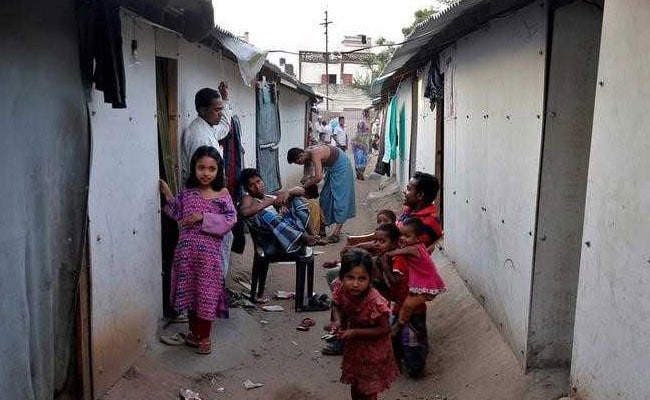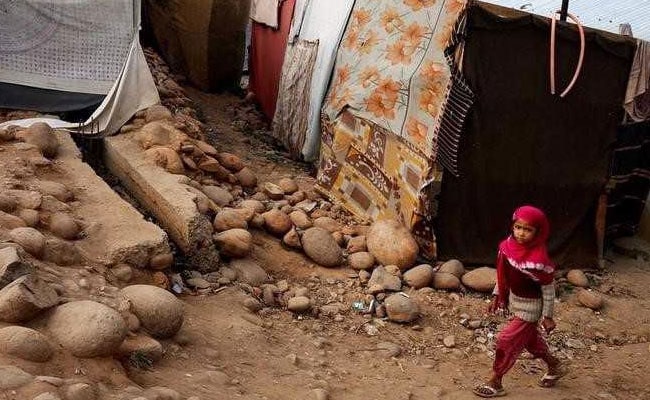
India considers Rohingya Muslims illegal immigrants, Union Minister Kiren Rijiju said.
New Delhi:
All of an estimated 40,000 Rohingya Muslims living in India are illegal immigrants, even those registered with the UN refugee agency, and the government aims to deport them, Union Minister Kiren Rijiju has told news agency Reuters.
The Minister of State for Home Affairs told parliament last week the central government had directed state authorities to identify and deport illegal immigrants including Rohingya, who face persecution in Buddhist-majority Myanmar.
The United Nations High Commissioner for Refugees (UNHCR) has issued identity cards to about 16,500 Rohingya in India that it says help them "prevent harassment, arbitrary arrests, detention and deportation".
But Mr Rijiju, a high-profile minister in Prime Minister Narendra Modi's government, said in an interview on the weekend that the UNHCR registration was irrelevant.
"They are doing it, we can't stop them from registering. But we are not signatory to the accord on refugees," he said.
 "As far as we are concerned they are all illegal immigrants. They have no basis to live here. Anybody who is illegal migrant will be deported."
"As far as we are concerned they are all illegal immigrants. They have no basis to live here. Anybody who is illegal migrant will be deported."
The UNHCR's India office said on Monday the principle of non-refoulement - or not sending back refugees to a place where they face danger - was considered part of customary international law and binding on all states whether they have signed the Refugee Convention or not.
The office said it had not received any official word about a plan to deport Rohingya refugees, and had not got any reports deportations were taking place.
The treatment of the roughly one million Rohingya in Myanmar has emerged as its most contentious human rights issue as it makes a transition from decades of harsh military rule.
The Rohingya are denied citizenship in Myanmar and classified as illegal immigrants, despite claiming roots there that go back centuries, with communities marginalised and occasionally subjected to communal violence.
Hundreds of thousands of Rohingya have fled from Myanmar, with many taking refuge in Bangladesh, and some then crossing a porous border into Hindu-majority India.
Many have also headed to Southeast Asia, often on rickety boats run by people-smuggling gangs.
Procedure
Rohingya are generally vilified in India and over the past few months, there has been a string of anti-Rohingya protests.
Mr Rijiju declined to comment on the deportation process, even as some human rights activists question the practicality of rounding up and expelling thousands of people scattered across the country.
 "There's a procedure, there is a rule of law," Mr Rijiju said.
"There's a procedure, there is a rule of law," Mr Rijiju said.
"We can't throw them out just like that. We can't dump them in the Bay of Bengal."
India said on Friday it was in talks with Bangladesh and Myanmar about the deportation plan.
But deportation is likely to be difficult, given Myanmar's position that all Rohingya need to be scrutinised before they can be allowed back in as citizens.
Myanmar officials were not immediately available for comment.
A senior government official in Bangladesh, which has complained of being burdened by the heavy flow of refugees, has said India was helping it solve the crisis.
More than 75,000 Rohingya have fled to Bangladesh since October 9 after an insurgent group attacked Myanmar border police posts, prompting a security crackdown in which troops have been accused of murder and rape of Rohingya civilians.
The Minister of State for Home Affairs told parliament last week the central government had directed state authorities to identify and deport illegal immigrants including Rohingya, who face persecution in Buddhist-majority Myanmar.
The United Nations High Commissioner for Refugees (UNHCR) has issued identity cards to about 16,500 Rohingya in India that it says help them "prevent harassment, arbitrary arrests, detention and deportation".
But Mr Rijiju, a high-profile minister in Prime Minister Narendra Modi's government, said in an interview on the weekend that the UNHCR registration was irrelevant.
"They are doing it, we can't stop them from registering. But we are not signatory to the accord on refugees," he said.

The treatment of Rohingya Muslims in Myanmar has emerged as highly contentious human rights issue.
The UNHCR's India office said on Monday the principle of non-refoulement - or not sending back refugees to a place where they face danger - was considered part of customary international law and binding on all states whether they have signed the Refugee Convention or not.
The office said it had not received any official word about a plan to deport Rohingya refugees, and had not got any reports deportations were taking place.
The treatment of the roughly one million Rohingya in Myanmar has emerged as its most contentious human rights issue as it makes a transition from decades of harsh military rule.
The Rohingya are denied citizenship in Myanmar and classified as illegal immigrants, despite claiming roots there that go back centuries, with communities marginalised and occasionally subjected to communal violence.
Hundreds of thousands of Rohingya have fled from Myanmar, with many taking refuge in Bangladesh, and some then crossing a porous border into Hindu-majority India.
Many have also headed to Southeast Asia, often on rickety boats run by people-smuggling gangs.
Procedure
Rohingya are generally vilified in India and over the past few months, there has been a string of anti-Rohingya protests.
Mr Rijiju declined to comment on the deportation process, even as some human rights activists question the practicality of rounding up and expelling thousands of people scattered across the country.

Rohingyas are denied citizenship in Myanmar despite claiming roots that go back centuries.
"We can't throw them out just like that. We can't dump them in the Bay of Bengal."
India said on Friday it was in talks with Bangladesh and Myanmar about the deportation plan.
But deportation is likely to be difficult, given Myanmar's position that all Rohingya need to be scrutinised before they can be allowed back in as citizens.
Myanmar officials were not immediately available for comment.
A senior government official in Bangladesh, which has complained of being burdened by the heavy flow of refugees, has said India was helping it solve the crisis.
More than 75,000 Rohingya have fled to Bangladesh since October 9 after an insurgent group attacked Myanmar border police posts, prompting a security crackdown in which troops have been accused of murder and rape of Rohingya civilians.
© Thomson Reuters 2017
Track Latest News Live on NDTV.com and get news updates from India and around the world

